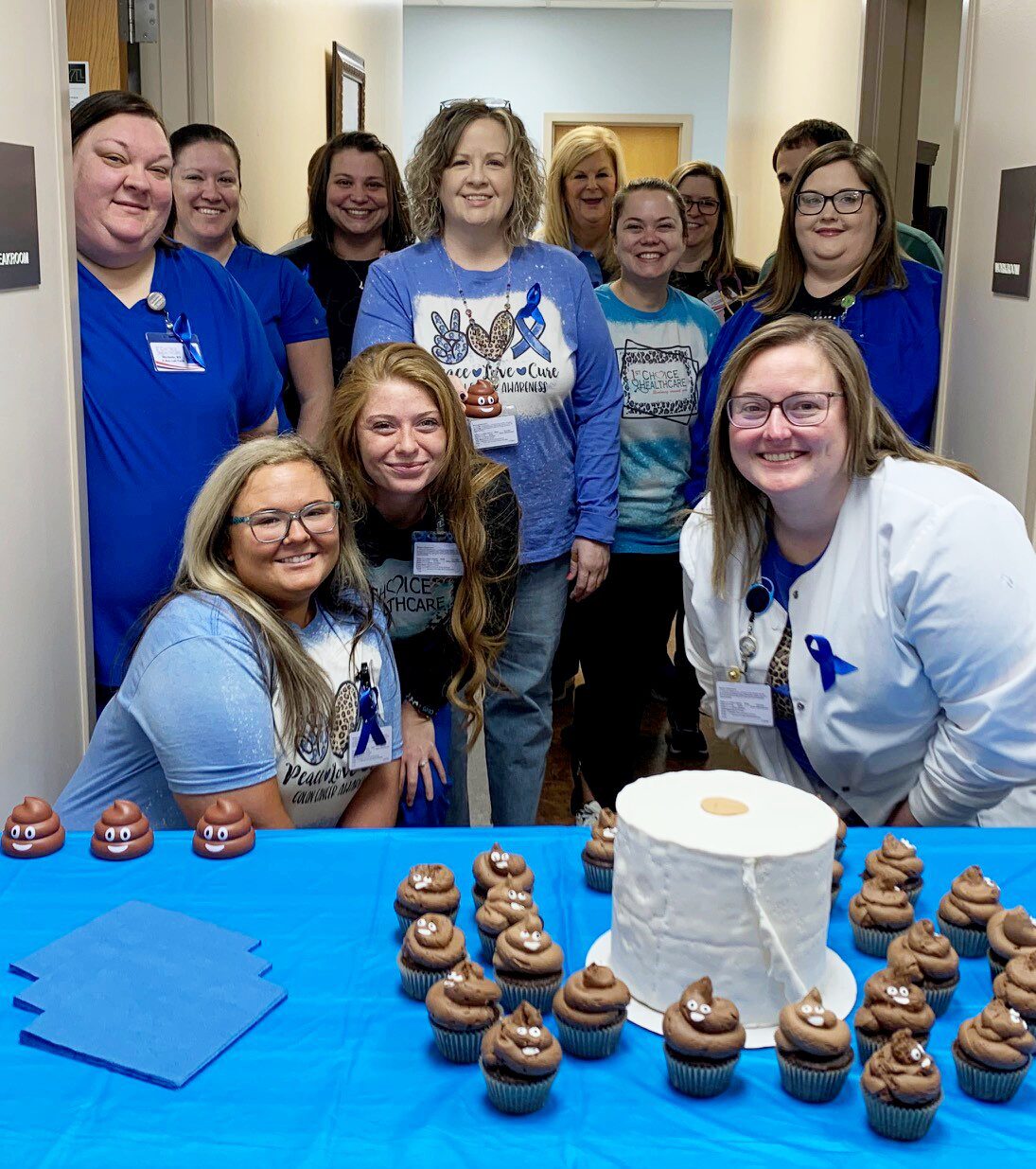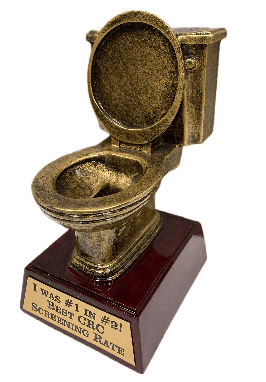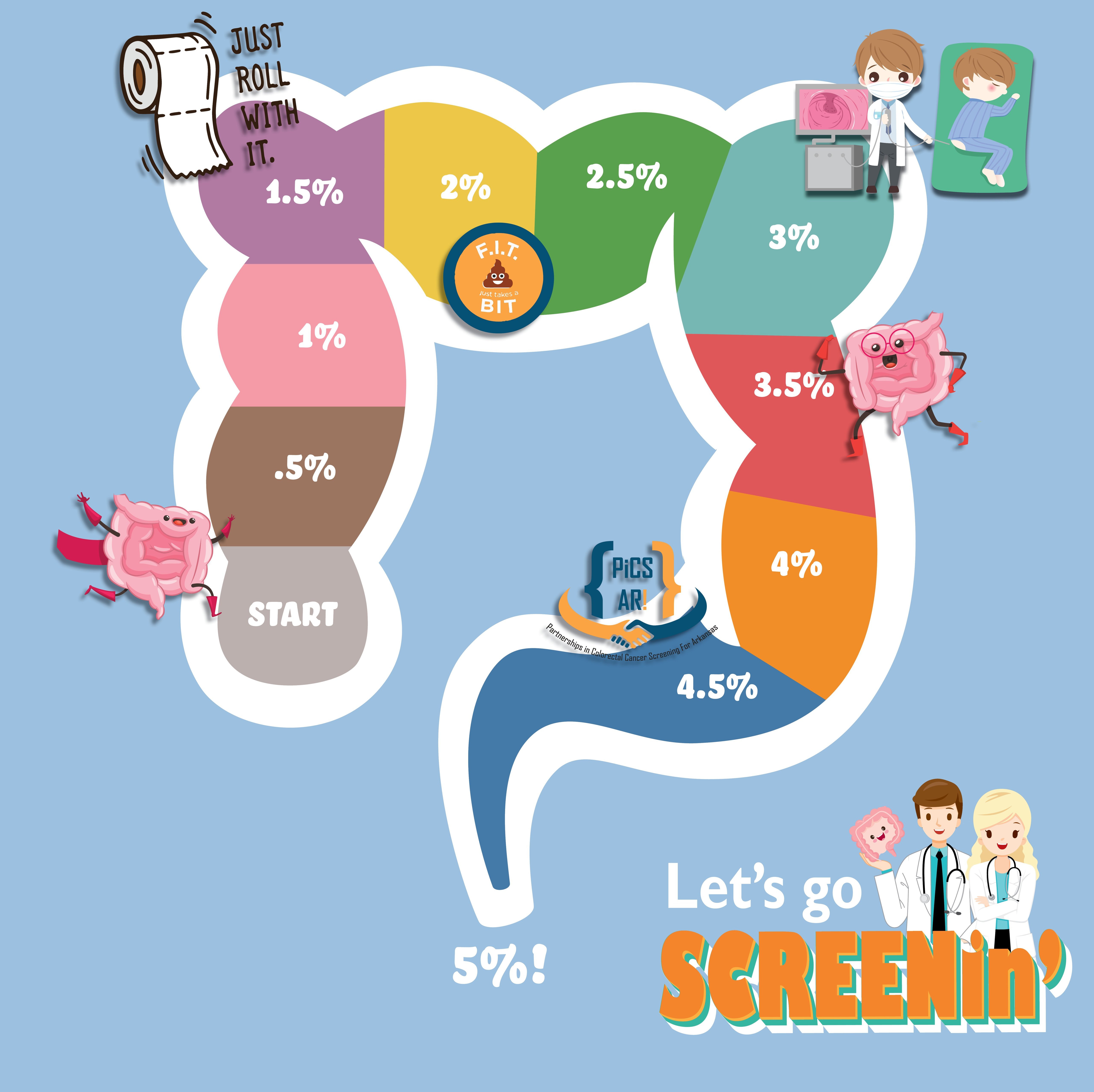FIT-ting Some Fun Into Colorectal Cancer Screening

1st Choice Healthcare staff brought the “fun” during colon cancer screening month in March with a toilet paper roll cake and poo emoji cupcakes.
The colorectal cancer screening rate is up 12% after three years at Arkansas’ 1st Choice Healthcare, a six-clinic system in a small pocket of northeast Arkansas. The providers and staff don’t take the subject lightly, but they’re also not opposed to a light-hearted approach that engages the patients and motivates the staff, often with friendly competition.
1st Choice joined UAMS’ Partnerships in Colorectal Cancer Screening for Arkansas (PiCS-AR!) in 2020 as part of the Centers for Disease Control and Prevention’s grant to raise colorectal cancer screening rates in Arkansas. The health system only showed a 37% screening rate when it began with PiCS-AR!.
Colorectal cancer is serious given that it’s the third leading cause of death in the country, and patients typically dread or avoid the gold standard screening method of a colonoscopy because the prep and procedure can be unpleasant. Marybeth Curtis, BSN, the program manager for PiCS-AR!, opted to address this heavy topic with a sense of humor to tackle the stigma surrounding colorectal cancer screening.
A new take on birthday cards

These birthday cards held a FIT test and let patients know that he screening age had lowered from 50 to 45.
Curtis needed a clever way to introduce patients to two things: the recently lowered screening age from 50 to 45, and the fecal immunochemical test (FIT) which is an easy and non-invasive alternative to a colonoscopy for those who aren’t at risk of getting colorectal cancer. Patient navigators sent birthday cards with “45 is the new FIT-ty” to all patients after their 45th birthdays. The message inside read, “The key to preventing colon cancer is regular screening starting at age 45. A good way to begin is with this easy-to-use home stool test called a FIT test. See instructions. To a long and happy life: Let’s make this a habit.” The navigators mailed about half of them with a return rate of 21%, while providers who handed them to their patients saw a 42% return rate. Overall, 12% of all returned kits showed positive for colorectal cancer compared to the national average of 7%.
Goodies, games and golden thrones

The coveted “golden throne” award
March was colorectal cancer awareness month, so Curtis, 1st Choice and Mid-Delta Health Systems (PiCS-AR!’s second clinic partner) invented ways to add humor. FIT tests are the easiest and cheapest type of colorectal cancer screening, requiring only a smear of the patient’s stool on a card that can be mailed in for testing. The staff wore “FIT Just Takes A BIT” buttons during the month and handed out FIT kits along with poo emoji stress balls. Patient navigators latched on to the fun and brought a cake decorated like a toilet paper roll along with poo emoji cupcakes. Each health system’s clinics competed against each other to see who could earn the “golden throne” award for the largest rate increase. The Mid-Delta clinic in Clarendon, Arkansas, topped all the clinics with a 3.5% screening rate increase in only one month.

The “Let’s Go Screenin’” game board will challenge providers to increase their colorectal cancer screening rates and encourage team participation.
The next phase of fun will include a game board named “Let’s Go Screenin’” to encourage provider engagement and team competition. Mid-Delta reported that the competition for March’s “golden throne award” elevated team building, so they recommended the game board to continue the friendly competition and keep colorectal cancer screening fresh in everyone’s minds. Providers in each clinic will vie to be the big finisher, moving their poo tokens around the colon as they increase their screening rates.
If you want to know more, Marybeth Curtis can be reached at mcurtis@uams.edu.
1st Choice Clinics Raise Colon Cancer Screening Rates by Almost Eight Percent
Colorectal cancer screening rates have risen by almost eight percent in one year for 1st Choice Healthcare clinics in northeast Arkansas, the first clinic partner in UAMS’ Partnerships in Colorectal Cancer Screening for Arkansas (PiCS-AR!), a Centers for Disease Control and Prevention grant.

1st Choice Healthcare clinics see eight percent increase in colorectal cancer screenings after one year.
Five out of six clinics in Salem, Pocahontas, Paragould, Corning and Ash Flat have pushed beyond their initial screening goals for colorectal cancer, the second most common cause of cancer deaths for men and women combined in the United States. First Choice Healthcare’s colorectal screening rate was at 37 percent a year ago, and most of the clinics hover in the mid-40s now. Pocahontas was a big winner with a jump from 29 percent to 45 percent, 16 points higher than a year ago.
Since September of 2020, UAMS and Arkansas Foundation for Medical Care (AFMC) have coached patient navigators at the clinics, a large piece of the success story. AFMC’s Stacey George, APRN, teaches the clinics about evidence-based interventions and ways to increase screening rates. Provider reminders/chart alerts in the clinics’ electronic health system worked particularly well. When patients visited, the clinic staff would check if they were due for a screening and set up appointments for those that needed it. George also pulls statistics from the clinics regularly to check progress.
“The leadership team at 1st Choice Healthcare has been engaged since the beginning,” said George. “They quickly embraced the opportunity to add patient navigators to their team, and we have seen the impact those ladies have made on the colorectal cancer screening rates in a very short period of time. To see the individual clinics and the healthcare system as a whole with marked improvements in their screening rates — in the middle of a pandemic — is phenomenal.”
Sandy Green, RN and director of nursing for 1st Choice, said the patient navigators educate the patient about the risk of developing colon cancer, and they explain the options for screening. A colonoscopy is the clearest, most complete screening, but another option is an at-home stool specimen test which offers a clue if cancer is present.
“The navigators are experienced RNs that are comfortable talking about colorectal cancer at all six of our clinics. Statistics have shown that dedicated resources to colon cancer screening education improves the number of people that are compliant with completing screening exams. Completing the screening in a timely manner will save lives,” said Green.
The team created a campaign around the Fecal Immunochemical Test (FIT), one of the at-home tests patients can do at home by sending in a smear of stool, which is e asier and cheaper than a colonoscopy. The “FIT just takes a BIT” campaign launched in March, which is Colorectal Cancer Awareness month. The clinic staff wore buttons, gave out poo emoji stressballs and FIT tests to all patients eligible for the screening. The CDC recommends screening for colorectal cancer to begin at age 45.
asier and cheaper than a colonoscopy. The “FIT just takes a BIT” campaign launched in March, which is Colorectal Cancer Awareness month. The clinic staff wore buttons, gave out poo emoji stressballs and FIT tests to all patients eligible for the screening. The CDC recommends screening for colorectal cancer to begin at age 45.
Marybeth Curtis, RN and program manager for PiCS-AR!, created the “FIT just takes a BIT” campaign.
“We needed a way to address a socially uncomfortable topic,” said Curtis. “The poo emoji on the pin was something people recognized, and it started conversations with patients asking, ‘What is FIT?’ Then, healthcare professionals were even more comfortable in bringing up the subject with patients. When was the last time you remember a healthcare provider asking you about your BMs? This is the stigma we were trying to overcome.”
